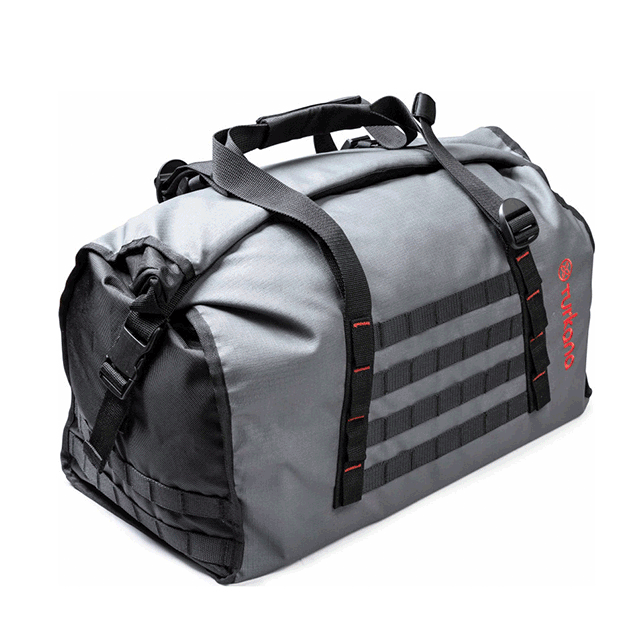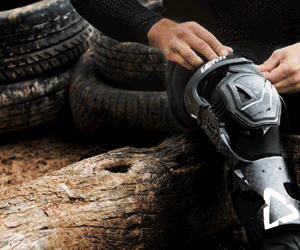“Like many kids from my generation, my friends and I had old 50 cc Simson bikes, and we would ride them through the woods. The forest rangers weren’t too happy about this, and so they would often call the police on us or even put nails in roots to puncture our tires. Fortunately for us, we never get caught, and I was free to get my license when I was sixteen. Then at eighteen years old, I got my license to ride bigger bikes and bought a Suzuki GZ 125 Marauder. Mainly because it was widely available and relatively cheap for me at the time. Unfortunately, the engine got totaled because the valves weren’t closing properly, so it was a short-lived friendship. Afterward, I really wanted to get a fast bike, but I knew that I wouldn’t be able to ride responsibly and so I decided to forget bikes altogether. This lasted for ten years, but then a spontaneous decision to buy some bikes on a trip to Vietnam in 2015 made me remember how much I missed riding. It made me realize that I love traveling on motorcycles much more than by any other means. We rode 1864 mi / 3000 km from Hanoi to Ho Chi Minh City, and it was one of the best experiences of my life.”

“My name is Martin Klauka, I‘m thirty-two years old and was born and raised in Germany. For a few years, I had this thought in the back of my head. That I wanted to change my life, get out into the world and explore. I wanted to find out what life had in store for me if I did something different to what society had taught me was the ‘right’ way. After the Vietnam trip, it was clear to me that the next adventure would be on a bike.” And so all Martin was missing was his next destination. “Given my financial situation, it would have to be as cheap as possible, which narrowed down my choices. I looked at the map and thought to myself, why not visit my good friend Feras who lives in Dubai. Still not sure about what I was doing I started researching a bike, visas, equipment and so on. In that period I learned more than in all the years before. That’s part of the beauty of going on an adventure. It didn’t take me long to get excited about the idea, and so I started telling family, friends and finally my employer, who wasn’t very happy about my decision.”

“I figured out that I needed an adventure bike and then started looking at a set of criteria. Mainly at durability, whether it could be fixed in remote corners of the world, the availability of spare parts, service intervals, price and so on. The old Africa Twin is praised for being one of the most reliable motorcycles available, and I took an instant liking to it.” The Honda Africa Twin XRV 750 RD07 was produced from 1990 to 2003 and is held in high regard as an overland adventure motorcycling legend. “I was pretty lucky when it came to getting my bike. After I decided that the Twin was the bike I wanted I started bookmarking a few searches and would go back to them several times a day. My bikes previous owner put it up for sale only seconds before I saw it and by the time it evening, he’d already had two more people that wanted to buy it without even seeing it. He was fair though and waited for me since I was the first caller.”

Mogli came into Martin’s life quite unexpectedly. It was in March 2017 and he was on a motorcycle trip through Morocco with some friends. On the second last evening of the journey, they were sitting in the streets of a small town when a little-malnourished cat with an injured tail approached them. “I called her, and she instantly came over, laid down in my arms and fell asleep. Locals told me her mother got hit by a car and that she would most likely die in the streets.” She was so exhausted that she barely moved and slept the whole night with Martin in his hotel room. “When I got up I was still full of doubt but already in love so I decided to put her on the motorbike to see how she would cope. Initially, she was wary of the bike, but after half an hour she calmed down and started getting more relaxed. It was then that I decided to take her along.”

“I had this trip in mind before I found Mogli and wouldn’t have known what else to do with her. I couldn’t just have put her in an animal shelter because that would’ve broken my heart. Even if someone would’ve taken her in and provided a loving home for another street cat I knew from the start that this was going to be my responsibility. And not an easy one.” As with any overland expedition, many miles are spent covering off-road sections, and Mogli isn’t always too happy about this. “To begin with she tells me off! She doesn’t like bumpy roads for obvious reasons, but if it has to be, she becomes surprisingly relaxed after a while. One time I even saw her trying to clean her paw when it was so bumpy that she kept missing it. In really rough terrain I just put her up on my shoulder and stand up.” Border crossings can especially be difficult when it comes to all the different rules and regulations involved with transporting an animal across them. “I’ve been waved through with her most times. A couple of times people would inquire about her papers only to not check them. I’ve only ever been refused at one crossing, but luckily the next border post wasn’t far away. The biggest difficulty so far has been to go through all the normal processes associated with borders while a cat perches on my shoulder.” Border guards aren’t the only ones taking notice though. “I think I’ve experienced every imaginable reaction and it surely is different from country to country. Turkish people have been the nicest and almost always got excited. The most people that got scared where in Iran and for the rest of the trip, some were surprised, and some even thought I was loony. Once I had a man literally asking me whether I was crazy.”

“I try to take things as they come. Mogli needed help, and I happened to be there. Was it the right decision? I don’t know, and it doesn’t matter because it’s in the past. What would have happened If I went on the trip without her? What if I ended up in a crash on one of the days that I spent looking for her? Or maybe it would have been ten times better without her. I’ll never know. The only thing I do know is that I would miss her if she weren’t with me anymore.” As one can imagine Mogli sometimes gets temporarily lost during stops and this is a constant point of worry for Martin. “Did she get locked in, did a dog get her, did she get injured? So I finally got around to doing some research about a tracker. GPS shows the location no matter how far away you are as long as a satellite connection can be established but this option is hefty because it needs a big power source that doesn’t last long. All of this makes it very impractical. Radio is very restrictive regarding range but only weighs a fraction of the GPS tracker. The batteries last for months, and it doesn’t incur any annual fees while the base price is also lower. So I ended up with the TabCat by Loc8tor, and it looks very promising.”

Along with the responsibilities of looking after Mogli there where also a few over-landing difficulties that Martin hadn’t expected. Mostly because of unexpected altitudes and underestimating the approaching winter with it’s shorter days and lower temperatures. “In Iran because cats are not allowed in hotels we were forced to camp even while it was still too cold. That was when I got the biggest fright on my way from Esfahan to Yazd in Iran. I started too late, as always, wish I could be more German when it comes to that, and ended up in the middle of the desert by nightfall. On my map, I could make out what seemed to be a lake, and so I decided to ride another 62 mi / 100 km in the dark. I almost crashed a couple of times. Once because the road suddenly ended, another time there were big potholes and another time because some dogs were chasing me. Freezing, exhausted, tired and hungry but in one piece I made it to the ‘lake.’ Only this wasn’t a lake but a 3/4 inch / 2 cm deep stream of salt water that ran through lifeless desert plains. I quickly forgot about the idea of trying to cross the stream. There was nobody there to help me if I got stuck and I didn’t want to take unnecessary risks, but when I turned around, I realized that it was already too late. My bike had sunk into the wet clay. A bit desperate and very annoyed about my stupidity I let out a loud scream and started to unpack the bike. Mogli could sense how tense I was and didn’t interfere. The bike is already heavy, but the wet clay did it’s best to create a vacuum. It wouldn’t budge at all. I got desperate, and that must have given me the strength to lift it out a bit, but not enough to get it out completely. I tried again, and this time I managed to get the rear tire out of its hole. Centimeter for centimeter I moved the bike out. It fell over once, but because of all the adrenaline, I picked it up like a bicycle. Months later I tried that again and was surprised at how much I struggled. I finally got it out, now sweating and soon to be even colder, I put up the tent, had a can of tuna and some nuts for dinner and went to bed.”

Since Martin got his trusty Africa Twin in December of 2015, he’s ridden about 23 600 mi / 38 000 km through seventeen different countries including Germany. On his latest trip to the United Arab Emirates, he crossed ten countries and covered over 8100 mi / 13 000 km. So it’s natural that there has been more than a few items replaced and fixed. The Achilles heel of the XRV750 is its fuel pump which is prone to breaking when least expected. “Mine did break, and I had it overhauled by a tinkerer in Austria that I found via a message board. In theory, I should now never reencounter problems with it. When the pump broke, the fuel lines also crumbled away in my hands, so I replaced them. A week later just before the start of the trip, a coolant hose broke so I replaced all of them too. I also had the cylinder head gasket changed as it was leaking a little oil. Along with this all the electrical contacts have been cleaned, a new muffler gasket installed and new front wheel bearing along with some other small stuff besides the normal service items.”

Martin has also had some aftermarket parts fitted to tailor the motorcycle more to his specific needs. A set of SW-Motech footpegs along with fog lights and brighter bulbs for the headlights now light the way. A Heavy Duties center stand, and crash-guards was fitted from the Romanian outfitters. The tank bag and panniers are supplied by Touratech along with the racks. “I prefer panniers because I can lock them, sit on them, they’re waterproof, I can use the lid as a little table for food, tools, and other stuff. They’re easy to organize, and I can strap my sleeping bag, mattress, and tent on top of it.” The RD07’s famous soft suspension has been remedied by a set of Wilbers fork springs and a rear shock. Martin also had the Tripmaster display overhauled. “The backlight is now LED, it shows the speed and has a control lamp built in that lights up when my voltage rises too high.” Up front, a set of risers make for a comfortable riding position while Acerbis hand guards protect the levers and hands. Also fitted are a RAM Mount phone holder and a 12v cigarette lighter style socket for charging. K&N filters air intake while a Guglatech fuel pre-filter is taking care of any possible contaminants to the go juice. Steel braided brake hoses, iridium spark plugs, a DID chain and a hand shortened windscreen round out the package.

Along with heavy duty tubes the Japanese built adventure legend ran the first part of its trip on Continental TKC 70’s. “They are awesome. With the dual compound, I got about 20 000 km out of them. They are about seventy percent on and thirty percent off-road. Recently I fitted the Mitas E07’s, which are a bit more on the off-road side. I’ve heard good things about them, so I’m excited to try them out for the second part of the trip.” Being on a tight budget, Martin also uses his phone for navigation. “I never saw the need to pay extra for a GPS. I have a few useful apps that are based on OpenStreetMap, which allows downloading all the maps and details for use offline. Maps.me was also one of the first apps I used and I have all my bookmarks, tracks, and recommendations saved in there. With its simple design, it allows for a good overview of what one needs to see. OsmAnd is another great one that shows rivers and lakes better than maps.me, and gives you your current elevation. Lastly, I also use Kurviger, which means ‘curvier’ and lets you set the parameters for the roads you want it to plan for you. It’s not always handy for places where the only connecting roads are highways, but I loved it in Europe.”

“It’s important to have the right mindset. I’m convinced that, if you don’t try to force things and just go along with whatever opens up then you’ll have a good time and amazing experiences. Basically, don’t struggle, it’s useless to try and judge situations because you never know what could have happened. Maybe that minor inconvenience that you are upset with saves your life further down the line because it prevented something else from happening. You’ll never know, and it doesn’t matter. I try to take every moment as a new starting point. One should always be respectful, towards other people, animals, and the environment. It goes a long way and changes your own behavior. People will feel the good energy radiating from you.” And with this good energy Martin reports that picking out any of the many magical moments that he’s had on the road wouldn’t do the other one’s justice. So it’s an ‘impossible’ question to answer for the young traveler. “One thing though that did make me feel like I’d arrived in a different world was when I first rode into Göreme in Cappadocia, Central Anatolia, Turkey. There, people have been carving homes, whole castles, and cities out of volcanic rock for thousands of years. The first thing I saw was Uchisar castle, and I almost crashed my bike because I couldn’t believe my eyes! I never do much research, and so I didn’t know what to expect. That truly was a magical sight for me.”
Martin and Mogli are currently on the second leg of their journey making their way through Pakistan. For more info follow them on their Instagram page.
Martin has also started a fundraising campaign to finance their way back to Europe. To help him and Mogli go here.





Nice article. I especially like the parts about the rider’s thoughts and the concept of the past isn’t real. Only this moment holds potential. Pretty much anyone can ride, not everyone thinks.